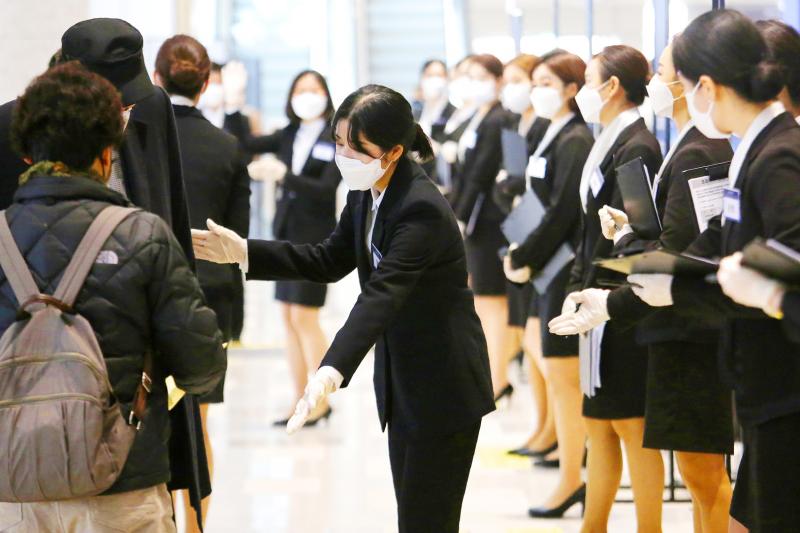Samsung Electronics Co Ltd yesterday said the COVID-19 pandemic would hurt sales of smartphones and consumer electronics this year, while demand from data centers would fuel a recovery in memorychip markets.
Samsung chief executive Kim Ki-nam said that the coronavirus and US-China trade dispute were casting a shadow over the outlook for the South Korean tech giant, whose Galaxy smartphones vie with Apple Inc’s iPhones for global dominance.
“The global smartphone market was expected to turn to growth this year, but with the virus showing signs of being prolonged, the smartphone market is contracting, but 5G smartphone demand is expected to rise,” Samsung mobile and network business president Koh Dong-jin told the company’s annual general meeting in Seoul.

Photo: AP
While the smartphone market would shrink, Kim said the chip market — which makes up about half of Samsung’s operating profit — would see demand growth after a slump last year that was exacerbated by excess supply and US-China trade tensions.
Other chipmakers such as Broadcom Inc have either cut or pulled their sales outlook due to disruptions caused by the pandemic, but global leader Samsung said that it expected investments from data center firms, and new opportunities in areas such as 5G wireless networks and the automotive industry to drive chip sales higher this year.
At the same time, Kim said that he expected chipmakers to focus on upgrading manufacturing processes rather than expanding capacity this year, limiting supply.
Samsung’s annual general meeting drew about 400 shareholders this year, sharply down from about 1,000 last year, as South Korea battles the biggest COVID-19 outbreak in Asia outside China.
Investors were scanned with thermal cameras and checked with thermometers as they arrived, and sat two seats away from each other as part of measures to ensure the meeting could go ahead safely.
Samsung Electronics also adopted electronic voting for the meeting and encouraged shareholders to cast votes online.
Kim Hyun-suk, the company’s consumer electronics chief, said it was too early to predict how the virus would impact consumers.
“We had expected the consumer electronics market to rise slightly this year, but with the coronavirus fast spreading, uncertainties are growing faster than ever, and it is very difficult to predict the future,” he said.

Among the rows of vibrators, rubber torsos and leather harnesses at a Chinese sex toys exhibition in Shanghai this weekend, the beginnings of an artificial intelligence (AI)-driven shift in the industry quietly pulsed. China manufactures about 70 percent of the world’s sex toys, most of it the “hardware” on display at the fair — whether that be technicolor tentacled dildos or hyper-realistic personalized silicone dolls. Yet smart toys have been rising in popularity for some time. Many major European and US brands already offer tech-enhanced products that can enable long-distance love, monitor well-being and even bring people one step closer to

TRANSFORMATION: Taiwan is now home to the largest Google hardware research and development center outside of the US, thanks to the nation’s economic policies President Tsai Ing-wen (蔡英文) yesterday attended an event marking the opening of Google’s second hardware research and development (R&D) office in Taiwan, which was held at New Taipei City’s Banciao District (板橋). This signals Taiwan’s transformation into the world’s largest Google hardware research and development center outside of the US, validating the nation’s economic policy in the past eight years, she said. The “five plus two” innovative industries policy, “six core strategic industries” initiative and infrastructure projects have grown the national industry and established resilient supply chains that withstood the COVID-19 pandemic, Tsai said. Taiwan has improved investment conditions of the domestic economy

Malaysia’s leader yesterday announced plans to build a massive semiconductor design park, aiming to boost the Southeast Asian nation’s role in the global chip industry. A prominent player in the semiconductor industry for decades, Malaysia accounts for an estimated 13 percent of global back-end manufacturing, according to German tech giant Bosch. Now it wants to go beyond production and emerge as a chip design powerhouse too, Malaysian Prime Minister Anwar Ibrahim said. “I am pleased to announce the largest IC (integrated circuit) Design Park in Southeast Asia, that will house world-class anchor tenants and collaborate with global companies such as Arm [Holdings PLC],”

MAJOR BENEFICIARY: The company benefits from TSMC’s advanced packaging scarcity, given robust demand for Nvidia AI chips, analysts said ASE Technology Holding Co (ASE, 日月光投控), the world’s biggest chip packaging and testing service provider, yesterday said it is raising its equipment capital expenditure budget by 10 percent this year to expand leading-edge and advanced packing and testing capacity amid strong artificial intelligence (AI) and high-performance computing chip demand. This is on top of the 40 to 50 percent annual increase in its capital spending budget to more than the US$1.7 billion to announced in February. About half of the equipment capital expenditure would be spent on leading-edge and advanced packaging and testing technology, the company said. ASE is considered by analysts